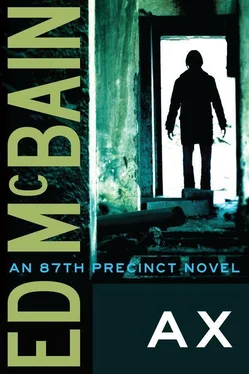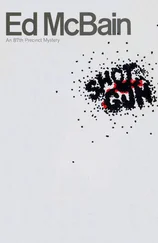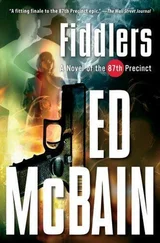“Well, what did your friend have in mind?” Corey asked.
“I’d help him myself,” Carella said, “but I’m not sure how.”
“I don’t think I follow you,” Corey said, puzzled now.
“You’re more in contact with things,” Carella said.
“What kind of things?” Corey asked.
“My friend craves action,” Carella said.
“What do you mean?” Corey said, and then squinted. “Dames, you mean?”
“No.”
“I’m not with you, Steve.”
Corey was not being deliberately obtuse. He was simply having difficulty in adjusting his frame of reference. He had come up to the squadroom expecting God knew what kind of bullshit from Carella and then had immediately realized that all Carella wanted was a percentage of the take. This hadn’t surprised him at all, even though the word around the precinct was that Carella was a square cop who didn’t take. Corey had met square cops who didn’t take before. But what it turned out to be, after you knew these square cops for a while, was just that they were very quiet about taking, that was all. So Corey figured Carella wanted a piece of the action, which was all right with him so long as he got off his back, and so long as the tariff wasn’t too steep. He’d begun to get nervous when Carella said he was very short of money, thinking this was going to be a real stickup. But then Carella seemed to switch in mid-stream and started talking about helping his friend himself, so that Corey figured maybe this really was a friend of Carella’s. Then Carella had told him his friend craved action, and Corey had immediately begun thinking again that Carella’s “friend” was really Carella, just as he’d thought all along. What Carella wanted, Corey figured, was for Corey to fix him up quietly with one of the hookers on the beat, easy enough. But no, Carella said it wasn’t dames.
“So what kind of action does your friend crave?” Corey asked, stressing the word “friend” and making it clear he knew Carella’s “friend” was really Carella.
“Cards,” Carella said. “Dice. Anything where he can parlay a small stake into some quick cash.”
“Oh,” Corey said. “I see.”
“Mmm.”
“Gambling action, you mean.”
“Mmm.”
The men fell silent.
Corey drew in on his cigarette.
Carella waited.
“Gee, Steve,” Corey said at last, “I wouldn’t know how to help your friend.”
“You wouldn’t, huh?”
“No, I’m sorry.”
“That’s a shame,” Carella said.
“Yeah. But, you know, there’s no gambling on my beat.”
“No.”
“No. Not to my knowledge, anyway,” Corey said, and smiled.
“Mmm,” Carella said.
“Yeah,” Corey said, and drew in on his cigarette again, and again the men were silent.
“That’s too bad,” Carella said, “because I had hoped maybe you’d know of a game.”
“No, I don’t.”
“So I guess I’ll have to scout one up on my own,” Carella said. He grinned. “That can get expensive, of course, since I’d have to do it on my own time.”
“Yeah,” Corey said, “I see what you mean.”
“Mmmm.”
“I could…uh…ask around, I guess. Maybe some of the boys know.”
“Well, I don’t think the boys would know without your knowing, too, would they, Ralph?”
“Sometimes,” Corey said. “You’d be surprised.”
“Yes, I would.”
“Huh?”
“I said I’d be surprised.”
“Well,” Corey said, rising, “I’ll ask around, Steve, and see what I can get for you.”
“Sit down a minute, Ralph,” Carella said. He smiled. “Another cigarette?”
“No. No, thanks, I’m trying to cut down.”
“Ralph,” Carella said, “would you like to tell me about the game in the basement of 4111 South 5th?”
You had to hand it to Corey, Carella thought. His face did not change, he did not bat an eyelash. He simply sat opposite Carella and looked at him serenely for several moments and then said, “4111?”
“Mmm.”
“South Fifth?”
“Mmm,” Carella said.
“Don’t think I know the game you’re referring to, Steve.” Corey looked sincerely interested. “Is it a card game?”
“Nope. Craps,” Carella said.
“I’ll have to look into it. That’s on my beat, you know.”
“Yes, I know. Sit down, Ralph. We’re not finished yet.”
“I thought—”
“Yes, sit down.” Carella smiled again. “Ralph, the man who was cutting the game wound up with an ax in his head. Name’s George Lasser, the super of the building. Do you know him, Ralph?”
“Sure, I do.”
“I think there may be a connection between the game and the murder, Ralph.”
“You do?”
“Yeah. That makes it a big-time game, doesn’t it? That makes it a game involved in homicide.”
“I suppose it does. If there’s a connection between the two.”
“Ralph, if there’s a connection between the two, and if it turns out that somebody on the force deliberately withheld information about that game in the basement of 4111 where a man got murdered, that can be pretty serious, Ralph.”
“I suppose it can.”
“Did you know about the game, Ralph?”
“No.”
“Ralph?”
“Yeah?”
“We’re going to find out.”
“Steve?”
“Yeah?”
“I’ve been a cop too long. Never shit a shitter, huh?” Corey smiled. “The guy who was running the game is dead. If I was cutting that game, Steve, and I’m only saying if— if I was cutting that game, the only guy who’d know about it besides me would be the guy who was running the game, right? And he’s dead, Steve. He got killed with an ax, Steve. So who are you trying to con?”
“I don’t like you, Corey,” Carella said.
“I know that.”
“I haven’t liked you from the minute I first saw you.”
“I know that, too.”
“If you’re connected with this…”
“I’m not.”
“If you’re connected with this, Corey, if you’re making my job tougher, if you’re hindering this case…”
“I don’t know anything about your crap game,” Corey said.
“If you do, and if I find out that you do, I’m going to put your ass through the wringer, Corey. You’re never going to look the same again.”
“Thanks for the warning,” Corey said.
“Now get the hell out of here.”
“Big detective,” Corey said, and he went out of the squadroom.
He was smiling.
But he was worried.
The tenants of a building in a slum area do not much give a damn about whether or not cops solve the cases they are working on. As a matter of fact, if one were to take a poll of any tenement building at any given time of the year, one would probably discover that 99 percent of the tenants would like it if every cop in the world immediately dropped dead. Well, perhaps not in April. In April, the air is mild and the breezes are balmy, and brotherly love prevails, even toward cops. In April, it is possible that the tenants might only express the desire for every cop in the city to get hit by a bus—maimed, but not killed.
It was January.
Cotton Hawes had his hands full.
To begin with, the man would not let him into the basement.
He had never seen the man before. He was a giant of a man, perhaps sixty years old, with a European accent Hawes could not accurately place. He stood at the top of the steps leading to the basement and wanted to know just what the hell Hawes wanted, and there seemed to be about him a perfection of parts: the immense head with its thatch of unruly, sandy-colored hair; the bulbous nose and large blue eyes and strong mouth and jaw; the thick neck and wide shoulders and chest, the muscular arms and huge hands—even the blue turtlenecked sweater under the brass-buttoned blue coveralls, all seemed of a piece, as though this man had been sculpted by someone with an excellent eye for proportion.
Читать дальше












